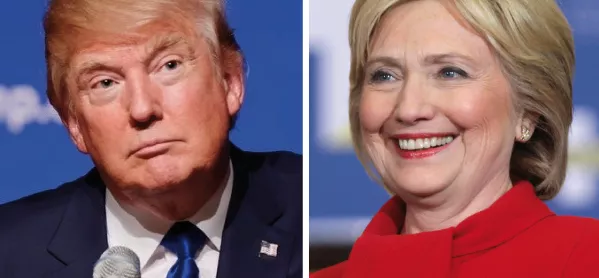TES has recently launched the free TES Teach app to help teachers create interactive lessons using digital content. For more information please visit www.tes.com/lessons
With the presidential race heating up as we near the election date, each of us has an opinion about who is best suited for the White House. Our political beliefs are often colored by the contexts in which we live and were raised and are therefore rooted in systems sometimes outside of the logical. At best, many of us know that politics is a gray area that we don’t necessarily want to bring up around students, or even friends and family members as we know it may end badly.
As a journalism teacher in the New York City department of education, teaching mostly 11th and 12th grades, it’s my job to make sure that students report accurately and fairly, always doing sound research and balancing ideas with the facts that support them.
Sometimes, it’s hard to get coverage of political campaigns because there aren’t always student reporters who are interested in the subject matter. Last school year, however, when the campaigns kicked into high gear early there was a group of male students who were very intrigued by Trump and the political process. Both excited by their close following of the election, I couldn’t help but raise an eyebrow to their early alignment with Trump.
At first, I listened from my side of the room as they’d debate about what they heard in the news about Bernie Sanders, Hillary Clinton and Donald Trump and I’d do my best to not get involved beyond offering feedback on their pieces. Because, let’s face it, teachers aren’t supposed espouse their own political beliefs in a classroom, it isn’t ethical to do so. Kids trust us and therefore our beliefs can sway their own which doesn’t make for sound learning because it’s somewhat prejudicial and not appropriate for conversation.
All students come from backgrounds that are suggestive of ideas and values that are discussed around the dinner table and because we’re not privy to those conversations, it’s better to listen than to participate in some of these classroom adventures. Students will undoubtedly try to engage us in this conversation, but we must do our best not to leave our emotions and values out of it and perhaps purposefully develop a line of questions to be the “devil’s advocate”.
As more time went on, it felt so peculiar that four ethnically diverse city boys who were 15 and 16 years old would be so on board team Trump that I had to start engaging in a dialogue.
One boy in particular was writing pieces not only about wins in early states, but about the process and various other opinion pieces about different events on the campaign trail. The facts he was getting were skewed though and it prompted me to have a discussion about where we get our news from and that even media sources have biases we need to be careful about.
The boys liked how candid Trump is. How he speaks his mind. They seemed less concerned about his lack of knowledge on important issues like foreign affairs and more concerned about how Hillary Clinton lied about her email. They were eating up what the media was selling.
One day after having taken a survey about which candidate my beliefs lined up with best, I recommended that the boys take the survey. Although I never shared with them what the results of my survey was, I did take the opportunity to have a discussion about political issues and how we can’t make emotional decisions when electing a president; we need to know the facts to make us better citizens.
It wasn’t surprising that most of the boys were more aligned with candidates like Cruz rather than Trump, but they were able to see that they did align with liberals in some areas of their values.
The outcome of this survey was a great way for us to have an open discussion about the issues and not about particular candidate views. Both encouraged by the students’ interests in the campaign and surprised by their conservative beliefs, it was an opportunity for me to check myself and the presumptions I come in with.
As teachers, it’s our obligation to raise important issues, get students engaged with these issues in an intelligent way despite the initially emotional response. We want students following the political process as they will soon be voting citizens and the better informed they are, the more involved they will be.
Want to keep up with the latest education news and opinion? Follow TES USA on Twitter and like TES USA on Facebook

